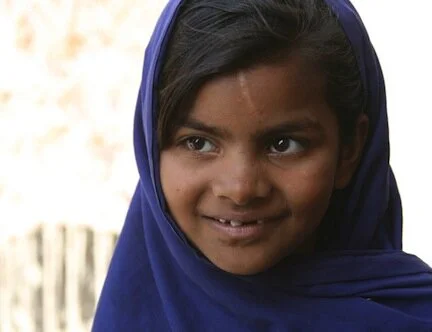Exclusive Interview with Nicholas Kristof: Women Hold Up Half the Sky
by Tabby Biddle
Photograph by Nicholas Kristof
Javaria lives near Lahore, Pakistan. Her mother, Saima Muhammad, was routinely beaten by her husband. Then Saima started a successful embroidery business. Her newfound prosperity won her husband's respect and transformed her family's educational prospects. Javaria is now in school and ranked first in her class. Her father, once disdainful of girls, says, "Girls are just as good as boys." Photograph by Nicholas Kristof.
Two weeks ago in Los Angeles the Skirball Cultural Center launched their "Women Hold Up Half the Sky" exhibit, inspired by the acclaimed book Half the Sky: Turning Oppression into Opportunity for Women Worldwide. The book was co-written by Pulitzer Prize winning journalists and husband and wife team, Nicholas Kristof and Sheryl WuDunn, and addresses the oppression of women and girls worldwide.
Two years ago, Dr. Robert Kirschner, Museum Director at the Skirball, saw a remarkable photo of an African woman on the cover of the New York Times Magazine. The accompanying articles were written by Nicholas Kristof and Sheryl WuDunn, based on their their recently-published book, Half the Sky.
Speaking at the opening of the exhibition, Dr. Kirschner said he wanted to use the book's message to create a vehicle to engage the community and spur action to address the crimes and cruelties that are inflicted upon women and girls every day. He believes, as do Nicholas and Sheryl, that the oppression of women and girls is the human rights cause of our time. "I had the temerity to make a cold call that actually found Nick and Sheryl, and they immediately embraced the idea," said Dr. Kirschner. Nick and Sheryl have been working with the Skirball over the past two years to develop the exhibition.
What follows is my interview with Nicholas Kristof, who writes an op-ed column for the New York Times that appears twice a week. Nicholas was in Los Angeles for the opening of the exhibit.
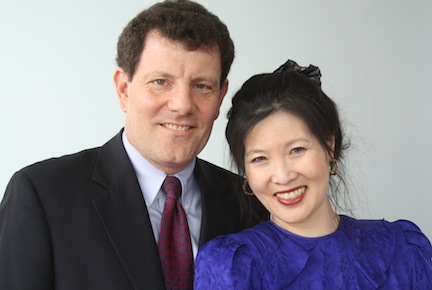
Nicholas Kristof and Sheryl WuDunn tell the stories of women and girls from around the world who have changed their lives through education, economics and self-determination. Photo courtesy of Nicholas Kristof.
Tabby Biddle: You write tirelessly about the atrocities facing women and girls around the world. Why are you drawn to this subject?
Nick Kristof: A couple of reasons...maybe three reasons. One is that some of the worst human rights abuses seem to me to involve gender. Second is that these tend to be neglected, and I think that we in journalism tend to do the most good when we shine our spotlight on issues that are neglected. And third, on a purely practical level, I think it's hard to find a more effective way to make a difference on issues like global poverty, peace and justice without empowering women and turning them into catalysts for change.
TB: You are one of the few voices out there at a major media outlet championing the rights of women and girls. Why is this?
NK: Traditionally what we in the news business do is cover what happened yesterday. These kinds of abuses tend to happen every day. Things that happen every day are frankly what we in the news business aren't good at covering because there is no one day in which they are news. So I think that's part of it. I think that there is also a lot of inertia in terms of what we consider to have news value. If there is something that we have been covering, we continue to cover it because it's on the global agenda. If there is something that we haven't covered, then we think of it as something that isn't newsworthy. So I think it's the combination of inertia and the fact that these are part of the backdrop, and also they are typically issues that politicians aren't quarreling about. I think the result is that they tend to get neglected.
TB: Why aren't politicians quarreling about these issues?
NK: Partly it's because we in the news business and the people in politics tend to reinforce each other in terms of what issues are on the agenda. More broadly these issues tend to be perceived as soft, peripheral issues that don't have easy political solutions and that voters don't usually care about. To some degree the extent of these issues are international ones. I don't think that voters are particularly clamoring to address some of these issues, and likewise I don't think television viewers are clamoring for networks to have more coverage of these issues, which is unfortunate, but I think that's the way it is.
TB: At the launch of Women Hold Up Half the Sky, you said: "Maybe we in journalism spend too much time focusing on the terrible things that happen. They are very real, but you also have these triumphs like with Goretti and Saima." [Nick was referring to two women who started their own businesses.] How do you feel covering the triumphs affects public consciousness?
NK: I do think that humanitarians and journalists alike have focused on all the things that go wrong, and that they sometimes leave the perception in the public that the war on poverty has been lost. That Africa is just a bottomless pit of despair. When in fact really the opposite is true on both fronts. There's been enormous progress in the global war on poverty - stunning declines in the number of kids that die each year, for example. Most of Africa has been growing pretty quickly over the last 10 years or so. I do fear that we focus so much on the disaster areas that we mislead people to the perception that this is hopeless - and as a result, they tune out.
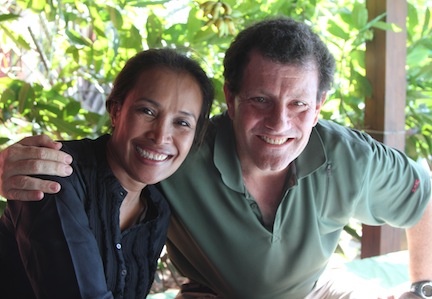
Nick with Somaly Mam from Cambodia. Somaly has dedicated her life to battling forced prostitution. After being sold as child to a Cambodian brothel, and enduring tortures and rapes, Somaly escaped and became an anti-trafficking activist. Photo courtesy of Nicholas Kristof.
TB: Do you think covering the triumphs makes a difference?
NK: I think humanitarian organizations should acknowledge the progress more than they do. I think that one reason people are reluctant to provide more help to Africa, for example, is this sense that it's just hopeless, in a way that I think is untrue. The Gates Foundation has been trying to send that message out that there really is progress.In the case of journalism, it's harder, and I've sort of struggled with this. The basic problem is that we in journalism cover planes that crash, not planes that take off. So it's sort of natural that we are drawn to war in Congo, genocide in the Sudan, AIDS in Southern Africa more than we are to economic development in Ghana or efficient, corrupt-free government in Rwanda.
In my travels I try to periodically do a column that acknowledges the progress, but I also have to say that I have done an awful lot more columns about Darfur or Eastern Congo than I have about the success stories. Then again it also seems to me that at the end of the day Sudan and Congo were still usually under-covered problems. So I struggle with that question all the time.
TB: Speaking of the success stories, the past couple of columns you did were quite positive. In the one that you did highlighting Room to Read and John Wood, you said: "The humanitarian world is mostly awful at messaging." Can you say more about this?
NK: I think that humanitarians think that marketing is something that corporations do to pedal products, and they flinch at the idea of serious marketing of important causes. I don't really care whether Toyota and Nissan market effectively, but it matters hugely to the world whether humanitarians can get the message out about malaria or about girls' education. It frustrates me no end that every day I get these very professional pitches from corporations trying to sell products that don't matter at all to the world. Then I see the most inept pitches from organizations about issues that would matter immensely to the world. I think the basic problem is that humanitarians flinch at the idea of marketing because they think that these issues are too important to be treated like that. But where lives are at stake, I think they are too important not to be treated like that.
TB: Do you think there is a new path in journalism in terms of helping these humanitarian organizations? In other words, do feel there is a place for the marriage of journalism and advocacy?
NK: I think one has to be really careful. It's certainly easier for me as a columnist to dance with advocates, if you will. But I also think we need to keep a certain amount of distance because I want to be able to criticize forthrightly any aid group that deserves it. I think there is a built-in tension in that I think that a lot of us went into journalism in part to try to make a difference. And yet you can't have everybody covering a city council meeting while trying to make a difference. There are some occasions when the issues you cover and the way you cover them that really leave you feeling you are doing some good and are leaving the world a better place. But you have to be very careful about the way you do that and the times you do that.
TB: You and Sheryl have a daughter and two sons. Are the rights of women and girls ever a topic of discussion at family dinners?
NK: Oh absolutely. We take family trips periodically and see these things firsthand. I think it's been great for the whole family to talk about these issues and to travel together.
TB: Who are the women in your life who have been strong influences?
NK: My mom was a university professor, now retired, at a time when there were not a lot of women becoming professors. She cares passionately about human rights, about activism, and plays second fiddle to nobody. Then Sheryl is a good example of a strong woman who is a pretty strong argument for men and women joining forces to hold up the sky together.
TB: Speaking about men and women holding up the sky together, do you feel there is a difference between feminine leadership and masculine leadership?
NK: I don't really know. I do know there have been a bunch of studies that have looked at this issue. They argue that male leaders tend to be more confrontational and conflict-oriented, and women more consensual. Maybe that's true. When we were writing Half the Sky we did look at women national leaders. It seemed to us that, at least so far, it had made no difference to countries whether they had female prime ministers or presidents on issues like female literacy or maternal mortality. Having an extra x chromosome at the very top of the country didn't really matter for those carrying extra x chromosomes at the bottom. But there is some pretty robust evidence that shows that it does matter when you have women leaders at the local level.
In India, in particular, there is pretty good evidence that having a female village chief means that there's less corruption. Probably because women are outside of the traditional networks to get pay-offs, and also that they pay greater attention to water, probably because collecting water is women's work.
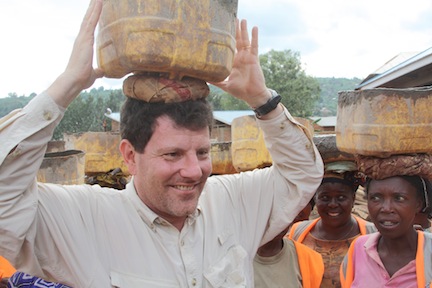
Nick Kristof in Congo. "One of the challenges in writing about this broad issue of women around the world is that there is a tendency to think of this as a worthy subject, but sort of a soft one. A little bit peripheral to the central issues of international relations," says Nick. Photo courtesy of Nicholas Kristof.
TB: That's interesting that there's more of a difference when women are in leadership at the local level, as opposed to the head of a country.
NK: At least so far. One can make the argument that that's partly because the first women to become national leaders tend to be either widows or daughters of male leaders from elite families. Or alternatively that tend to be very tough conservatives like Margaret Thatcher, for example. Maybe as we have more experience with women leaders it will be different. But at least so far I don't think there is any compelling evidence that women leaders at the top make much difference for women at the bottom.
TB: In terms of more women coming into leadership, it seems obvious that we need to continue to create a global culture where women and girls are respected and valued. What do you think are some of the most effective ways to help make that shift?
NK: I think girls' education is the single most important thing one can do. I think there is abundant evidence that educating girls changes almost everything. It not only helps those individuals, but it really does help the community as well. There is an African expression that if you educate a boy, you produce an educated man. If you educate a girl, you raise the whole village. I think that is true, and ultimately you are bringing women from the margins of society into the mainstream when you promote education like that.
TB: You emphasize the importance of educating girls in Half the Sky - in both the book and the exhibit. What do you hope happens as a result of the exhibit?
NK: I think the thing that excites us most is the possibility of it becoming a traveling exhibit and reaching people all over the country, and ultimately all over the world. One of the challenges with a book is that at the end of the day you have to have some pre-existing interest in the subject to pick up a book and read it. In contrast, you can go to a museum exhibit by accident, and then it can nurture an interest in the subject and awaken one to an issue. Eventually it leads one to perhaps read the book or at least get engaged in these issues. For Sheryl and me, it's very important that we reach beyond the choir. We think that a traveling exhibit will be a great way to do that.
TB: What's your outlook for the future in terms of a global culture valuing and respecting women and girls?
NK: I'm optimistic. I think that illiteracy is on the decline. More and more boys and girls alike are going to schools, and that is transformative for both genders. I also see that issues like sex trafficking are rising on the agenda - that people are beginning to pay attention to them. I see that family planning is steadily making more inroads around the world. Ultimately the benefits to countries of having women out of the margins and in the mainstream of their country and fulfilling an economic role - the benefits are so enormous that for purely pragmatic reasons, they can't afford to leave girls uneducated and women outside the labor force. I think that this is a battle that the world is actually winning. I just wish that we were winning it a little more quickly than we are.
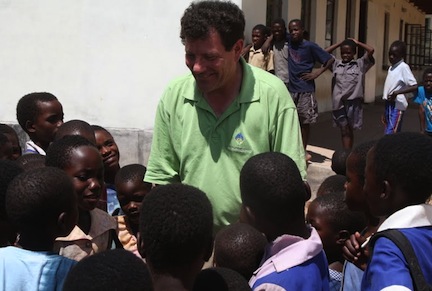
Nick Kristof with school children in Zimbabwe. "Sometimes there's the danger that the problems are too vast and too depressing that one tunes out. I think it's important to remind people that change is not only possible, but it's under way," says Nick. Photo courtesy of Nicholas Kristof.
TB: If you had a loudspeaker that could be heard by all men around the world, what message would you want to impart?
NK: First I would sort of push back at the question in that I think it's a mistake to think of the problem as basically men. I think that very often women do extraordinarily nasty things to other women. When you look at opinion polls, there is a modest difference in men's and women's attitudes on gender issues. If you look at attitudes toward wife beating, for example, women tend to be slightly more against wife beating than men are, but only slightly. The best predictor of whether someone is for or against wife beating is not whether they are male or female, but whether they live in an urban or rural area, and whether they are educated or not. So I guess I would try to adjust my loudspeaker so I could reach everybody.
In this case my message would be — putting aside the moral issues, at a purely pragmatic level that if one wants a stronger country; if one wants to address environmental issues; if one wants to chip away at global poverty; if one wants to reduce the threat of civil conflict and terrorism; then there are no quick fixes to any of these problems. But in general educating girls around the world, and bringing those educated women into the labor force tends to work better than just about anything else. At the end of the day women aren't the problem. They are the solution.
To help end the worldwide oppression of women and girls, join the Half the Sky Movement.
Learn more about the Women Hold Up Half the Sky exhibit at the Skirball Cultural Center here.
This interview was first published in The Huffington Post.
Tabby Biddle, M.S. Ed. is a writing coach, teacher, and writer on women, power and human rights. Learn more at tabbybiddle.com

